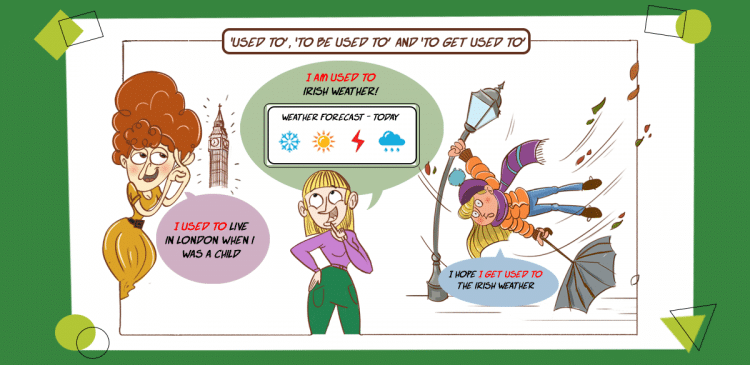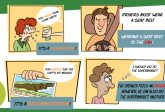‘Used To’, ‘To Be Used To’ and ‘To Get Used To’

Do you find it hard to get used to new grammar? You used to understand English better when you were at school? One of the difficulties that students face when learning English is that there are several words or phrases that at first glance seem very similar, but actually have very different meanings. In this blog post we’re going to have a look at three of these:
- ‘Used To’ as in I used to play football every Saturday when I was a child.
- ‘To Be Used To’ as in I’ve been living in Ireland for a long time now, so I’m used to the weather here.
- ‘To Get Used To’ as in It’s sometimes hard to get used to living in a foreign country.
Let’s get cracking and see what’s what!
'Used To'
The first thing that is important to know is that the phrase ‘Used To’ is actually very different from the other two phrases we’re going to study (‘Get/Be’ Used To).
Used to is a verb. But it’s a unique verb because it only exists in the past tense! Used to should not be confused with the verb to use which means to utilise.
We say used to when we want to talk about past habits or repeated actions in the past (that don’t happen anymore). We always follow used to with the infinitive of the main verb
For example, if you lived in London as a child but now you live somewhere else you can say:
I used to live in London when I was a child.
If, in the past, you and some friends went to the cinema every weekend but now you don’t, you can say:
My friends and I used to go to the cinema every weekend.
If, in the past, your sister managed a bookshop but now she has a different job, you can say:
My sister used to be the manager of a bookshop.
In the question and negative forms of used to we ‘drop’ the letter ‘d’. For example:
Did you use to smoke?
Did she use to work in the library?
I didn’t use to eat so many potatoes.
We didn’t use to live in the city.
'Used To' = Past Habits/Repeated Past Actions
We use Used to when we talk about our Past Habits or about Repeated Actions in the Past.
Examples:
Positive: She used to live in London.
Negative: She didn’t use to live in Dublin.
Question: Did she use to live in London?
'To Be Used To'
We use the structure ‘To Be Used To’ to communicate the idea that something was strange for us at first but after we gained more experience of it, we became accustomed to it – to the point that it is now totally normal for us.
For example:
If you found studying English a little strange at the beginning but you do not find it strange today, you can say:
I am used to studying English
If you thought that the weather in Ireland was very strange when you first arrived but now you do not think it is strange, you can say:
I am used to Irish weather
In the structure ‘To Be Used To’ the verb is to be. The words used to function as an adjective. The word to is a preposition in this case. Prepositions in English are always followed by a noun or a gerund.
is followed by either a Noun or a Gerund (‘-ing’ form of a verb)
'To Be Used To' = Be accustomed to something
We use To Be Used To when we talk about things which we found a little strange or unusual at first, but now we are comfortable with them. ‘To Be Used To’ describes the state of being accustomed to these things.
To Be Used To + Noun
I’m used to the weather here.
To Be Used To + Gerund (‘-ing’)
I’m used to living in this country.
'To Get Used To'
We use the structure ‘To Get Used To’ to talk about the process of becoming accustomed to an action or situation.
If you make a change in your life there may be a period of time in which you have to become accustomed to, or get used to, new things.
For example, if you moved from Spain to Ireland, you would probably need
some time to become accustomed to things that are different from life in Spain. At first the Irish weather might seem very strange to you. You could say:
I hope I get used to the Irish weather.
After a month or two, you might say:
I’m getting used to the Irish weather.
This means you are in the process of becoming accustomed to the Irish weather.
After a year, you might say:
I am used to the Irish weather.
This means the process is finished and Irish weather is now normal for you.
If you stay in Ireland for a long time but still think the weather is very strange, you could say:
I will never get used to Irish weather!
The structure ‘To Get Used To’ is followed by either a Noun or a Gerund (‘-ing’ form of a verb)
'To Get Used To' = Become accustomed to something
We use To Get Used To when we talk about things which we find a little strange or unusual. ‘To Get Used To’ describes the process of becoming accustomed to these things.
To Get Used To + Noun
I’m getting used to the weather here.
To Get Used To + Gerund (‘-ing’)
I’m getting used to living in this country.
The Important Grammatical Difference!
In order to use these phrases correctly (and speak amazing English!) it’s important to learn the grammar structures.
So remember:
Used to is a verb. It is always followed by the infinitive of the main verb.
To be used to and to get used to are phrases in which used to is an adjective. Because the word to is a preposition (not part of the infinitive), they are always followed by a noun or a gerund.
For example:
I used to live in Dublin. – CORRECT
I used to drive on the right hand side of the road. – CORRECT
I’m getting used to live LIVING in Dublin.
I’m used to drive DRIVING on the left hand side of the road.
The Grammatical Difference
Used To is followed by an Infinitive with ‘to’
I used to live in England
To Get Used To is followed by a Noun or a Gerund
I’m getting used to living in Ireland
To Be Used To is followed by a Noun or a Gerund
I’m used to living in Ireland
Vocabulary
Glance: sight, look
Extremely: very
Habit: an activity that you do regularly
Be accustomed to: something is normal or comfortable for you because you have experience of it
Idioms
At first glance: when you look at or think about something for the first time. Your first glance usually doesn’t give you complete information about the thing you are looking at/thinking about
Have a look: To look at / To study
Let’s get cracking: Let’s begin/start
Test Yourself
Thank you for reading our post. You’ll find more English grammar tips elsewhere on our site and if you’d like information on our online English courses live from Dublin, please do not hesitate to contact us.






